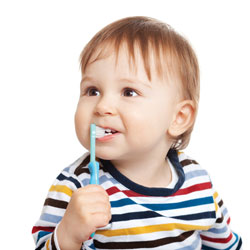
Healthy teeth are important—even baby teeth. Children need healthy teeth to chew and to speak clearly. And baby teeth hold space for adult teeth. Here are five things you can do to keep your baby's mouth healthy and give him or her a healthy start!
1. Find out if your tap water has fluoride in it (check with your local water utility).
- If your tap water does not have fluoride, your dentist or physician might suggest fluoride in other forms to keep your child's teeth healthy.
- If your tap water does have fluoride—and your baby drinks only formula that has to be mixed with water— you may want to use bottled water (without added fluoride) some of the time. Here's why: Mixing powdered or liquid infant formula concentrate with fluoridated water on a regular basis may increase the chance of a child developing dental fluorosis on his or her permanent teeth.* Fluorosis appears as white lines or flecks on the teeth. It is usually mild; in many cases, only a dental professional would notice it.
*If children regularly consume higher-than-recommended amounts of fluoride during the teeth-forming years (age 8 and younger), their permanent teeth may develop dental fluorosis.
2. Check and clean your baby's teeth.
Clean the teeth as soon as they come in with water and a clean, soft cloth or a baby's toothbrush. Healthy teeth should be all one color. If you see spots or stains on the teeth, take your baby to a dentist. At about age 2 (or sooner if a dentist or physician suggests it) you should start putting fluoride toothpaste on your child's toothbrush. Use only a pea-sized drop of toothpaste.
3. Don't put your baby to bed with a bottle.
Milk, formula, juice, and other drinks such as soda all have sugar in them. Bacteria in the mouth use sugar to make acid. Over time, this acid can make a cavity in the tooth. The longer sugar stays on your baby's teeth, the more chances the bacteria have to make acid. And more acid means more decay. So if you do put your baby to bed with a bottle, fill it only with water.
4. Feed your baby or toddler healthy foods.
- Choose foods without a lot of sugar in them.
- Give your child fruits and vegetables for snacks.
- Save cookies and other treats for special occasions.
5. Take your child to the dentist by age 1.
At this visit, the dentist will check your child's teeth and show you the best way to clean them.
Children's Dental Health / What Parents Can Do: Babies & Toddlers / What Parents Can Do: School Age Children / Improving Dental Health in Underserved Communities / Latest Research from NIH's National Institute of Dental and Craniofacial Research
Summer 2012 Issue: Volume 7 Number 2 Page 23
